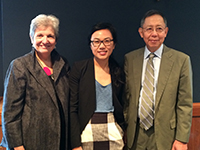September 2015

Felice J. Levine (AERA); Danielle Li (Harvard
Business School); Richard Nakamura (NIH) |
On September 22, AERA Executive Director Felice J. Levine moderated a congressional briefing—“NIH Priority Setting: How Peer Review Assists the NIH in Selecting the Best Science”—held by the Coalition to Promote Research. In her introductory remarks, Levine emphasized the history of peer review at the National Institutes of Health (NIH) and the role of review panels in supporting the highest quality science.
The briefing featured presentations by Richard Nakamura, director of the Center for Scientific Review at NIH, and Danielle Li, assistant professor of entrepreneurship at the Harvard Business School. Nakamura described the NIH peer review process, noting that participants on peer review panels are independent scientists who have high expertise and engage in thorough discussions. He also discussed the economic benefits and medical advances yielded by NIH-funded research. Nakamura concluded by discussing how other countries are catching up with the United States in funded research and development.
Li presented data from a study she conducted, in which she analyzed 130,000 awards that were funded through NIH’s Research Project Grant program to track outcomes for publications and patents. She found a significant correlation between a decrease in citations and an increase in percentile rank. However, grants that were funded “out of order” based on the judgment of program staff had a higher-than-expected citation rate for publications stemming from the grant. Li also noted that reviewers provide a value-added benefit because their expertise in particular fields enables them to determine whether an application is advancing a new idea.
Overall, the briefing highlighted the importance of NIH’s peer review system in advancing science that is both rigorous and relevant, not just to scientists but also to the public.